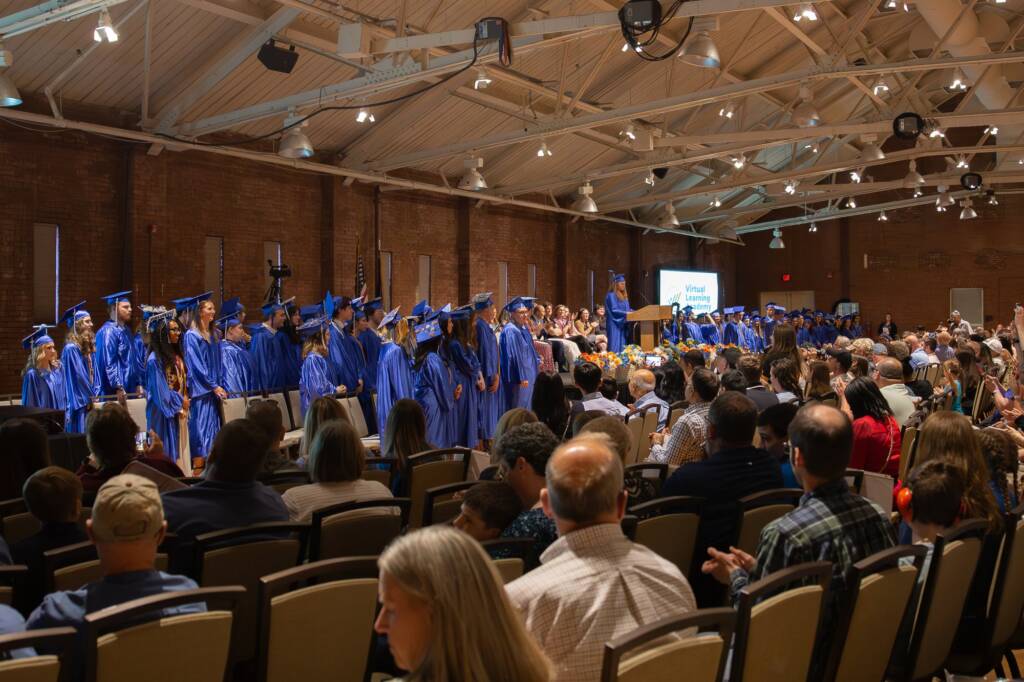“Hello! So glad you found the Zoom link for our welcome call! Welcome to VLACS! Is that your Dad I see waving in the background?”
“Hi! Yes, that’s my Dad.”
“Great! Let’s get started! I’m your Spanish 1 teacher and I can’t wait to work with you and your family. Do you have any questions before we get started?”
So begins the Virtual Learning Academy Charter School (VLACS) welcome call, the signature event that kicks off every student’s VLACS experience.
New Situations
New situations with new people make many people nervous.
Think back to the last time you had to interact with a roomful of strangers. What did you do? Did you run and hide? Probably not, though you may have wanted to. No, you probably took your time, grabbed a coffee or tea, and struck up a tentative conversation with the person sitting next to you.
You broke the ice. You tried to connect.
That connection is a cornerstone of human relationships and communication–and it’s a key to your personal success.
It’s also a key to a student’s academic success, especially at VLACS.
Now think back to those teachers you liked the best in school, the ones for whom you worked your hardest, did your best. Chances are that the ones you like best are not only the ones who taught you well, but also the ones with whom you connected.
They took the time to get to know you–and you let them.
There’s something to it.
What the research says about relationships
A University of Virginia study published by the American Psychological Association on improving student-teacher relationships, researchers Sara Rimm-Kaufman, PhD, and Lia Sandilos, PhD found that relationships are critical to student success.
They found that, “Solely improving students’ relationships with their teachers will not produce gains in achievement. However, those students who have close, positive and supportive relationships with their teachers will attain higher levels of achievement than those students with more conflict in their relationships.”
What does that mean? Positive, collaborative relationships among students and teachers are a good start, but that’s not enough for student success. Dr. James Comer, the Maurice Falk Professor of Child Psychiatry at the Yale Child Study Center knows what student success requires
Since 1968, he’s researched education, leadership, and child development. In a PBS Interview with Pulitzer Prize-winning journalist Hendrick Smith, Comer explained the Comer School Development Program (SDP). He started the SDP in 1968 to help close the achievement gap in New Haven’s two lowest-achieving and lowest-income elementary schools. He succeeded.
The program was so successful that P-12 programs in over 1000 schools in 26 U.S. states, the District of Columbia, Trinidad and Tobago, South Africa, England, and Ireland replicated it.
What makes it successful? Its focus is on collaboration and relationship-building among all stakeholders–children, teachers, school administrators, parents, and caregivers.
Collaboration and Relationships
Comer explained to Smith, “When the adults in the setting are committed to learning and are working together to create programs that are in the interests of the children and the children have a great relationship with the adults, they are then motivated to become academic learners. And that’s why you have to pay attention to their development, to the relationship that promotes their development, and then that makes the children available for learning. But to walk in and start pitching information to them without it, it’s like trying to grow a crop without tilling the soil.”
Comer also explained to Smith that “development and learning are inextricably linked. When you are developing well, you will learn. You will be motivated to learn. Adults around the kid must create an environment that supports development, that makes learning possible, or promotes learning.”
Those “adults around the kid” include not just teachers but other adults in the child’s life, like parents, family, and other caregivers.
Where does that leave us?
Relationships matter. We have to work together to help foster them.
The Welcome Call
At the Virtual Learning Academy Charter School, or VLACS, New Hampshire’s online charter school, the “adults around the kid” concept looks different but still applies. In the virtual classroom, forging strong relationships and collaboration among the “adults around the kid” is more important than ever for a student’s success.
How does VLACS do it?
Any time a student registers for a course, VLACS assigns them a NH state-certified and VLACS-trained instructor who greets them before they have access to the middle- or high school Course, Project, or Experience course.
Once assigned to a learning journey and an instructor, students and their families–however they define them–receive an email from their instructor. In this email, the instructor welcomes them to the learning journey and directs them to schedule what VLACS calls “The Welcome Call,” a virtual, 20-minute relationship-building greeting designed to welcome families and review pathway specifics.
Zoom!
To schedule the Welcome Call, instructors direct students and their families to click on a link to Schedule Once, VLACS’s scheduling platform. Once students schedule the Welcome Call, they receive a follow-up email from Schedule Once with instructions that the instructor provides.
The call itself happens over a video conferencing platform called Zoom, which students and their families can access from their desktops, laptops, tablets, or other mobile devices.
VLACS requires all students–even those who have taken VLACS Pathways before–attend a Welcome Call with their parent or guardian.
Why? To ensure that everyone is on the same page. To allow students and their families to ask questions. To set the stage for collaboration and success.
Ollire Lane from VLACS says, “Welcome Calls afford me the opportunity to share my ‘virtual smile’ as I initiate my relationship with both the parent and the student. It’s amazing to ‘hear’ their smile in return when this initial conversation opens the door to my virtual classroom, where VLACS’ innovative communication tools and quality curriculum create an exciting place to explore together.”
Building Relationships
During the Welcome Call, the VLACS instructor takes the time to get to know the students. They ask about the student’s goals and give them and their families a tour of the virtual classroom, an overview of the pace chart, and expectations for moving forward, students, their families, and VLACS instructors engage in conversation.
They also take time to get to know their students’ families–their parents, grandparents, guardians, and other caregivers. Why? Because everyone is involved in setting up a positive situation for the student’s success.
They make connections.
Instructors ask what brought new students to VLACS and ask why veteran students keep coming back. They talk about other responsibilities and activities. They ask family members what their goals are and how they can be most helpful to the student’s success.
VLACS instructors learn a myriad of valuable information about their students–whether they play sports, compete competitively, are interested in drawing or theater, write books, or travel the world.
The Welcome Call is the opportunity for VLACS instructors and their students to begin to set the stage for the relationship that will develop over time and create the kind of necessary environment that Comer describes as “the environment that supports development, that makes learning possible, or promotes learning.”
While the VLACS pathways offer a great service to students and families looking for alternative pathways to education, the promise of relationship and collaboration among the “adults around the kid” fosters the real learning and opportunity for academic and emotional growth.



